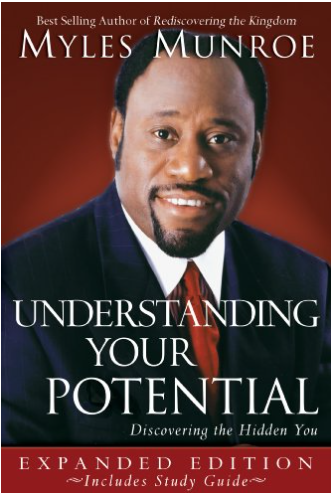In the pursuit of personal growth and self-improvement, understanding and realizing one’s potential is a journey that many of us embark on. Myles Monroe’s “Understanding Your Potential” is a beacon for those navigating this path. With its profound insights and actionable advice, the book encourages readers to look beyond their current circumstances to what could be possible. This blog delves into key concepts from Monroe’s book and explores how anyone can start to tap into their hidden talents and abilities.
What Does Potential Mean?
Potential, in the context of Monroe’s teachings, refers to the untapped abilities and capacities lying dormant within each person. It’s what you can achieve but haven’t achieved yet. Monroe persuasively argues that every individual possesses a wealth of potential that, if discovered and harnessed, can lead to extraordinary accomplishments.
Key Insights from “Understanding Your Potential”
- Everything in Life Has Potential: Monroe starts with the premise that everything created has potential, including human beings. He points out that just as a seed has the potential to grow into a tree, every person has the potential to achieve more than they currently realize. The first step is to recognize this inherent potential within ourselves.
- Purpose is the Key to Unlocking Potential: According to Monroe, understanding your purpose is crucial to unlocking your potential. Purpose gives your life direction and helps you focus your energy on what matters most. Without knowing your purpose, it’s challenging to fully realize your potential. Monroe encourages readers to seek their purpose through introspection, spiritual practices, and exploration of their natural talents and passions.
- Environment Influences Growth: Monroe highlights the importance of the right environment for potential to be realized. Just like a seed needs the right soil to grow, people need supportive environments that nurture their growth. This might mean seeking out mentors, aligning yourself with like-minded individuals, or placing yourself in situations that challenge you and foster growth.
- Action is Required: Knowledge of potential and purpose is not enough; action is required to make any significant changes. Monroe motivates readers to take concrete steps towards realizing their potential. This includes setting goals, developing skills, and making commitments to pursue your ambitions relentlessly.
- Overcoming Fear and Complacency: Fear and complacency are two major barriers to realizing potential. Monroe addresses these challenges head-on, encouraging readers to step out of their comfort zones and confront their fears. By doing so, you allow yourself to grow and evolve in ways that complacency never will.

Practical Steps to Discover Your Potential
Realizing one’s full potential is a dynamic and ongoing process that requires dedication, self-awareness, and a proactive approach. Here’s a deeper look at the practical steps you can take to unlock and maximize your potential.
Self-Assessment: A Foundation for Growth
Self-assessment is critical in understanding where you currently stand and where you might go. This involves a thoughtful reflection on what you naturally excel at and what you struggle with. Identifying your passions is equally crucial, as they often point towards areas where you could potentially excel and feel most fulfilled.
Tools and Techniques:
- Personality Tests: Instruments like the Myers-Briggs Type Indicator (MBTI) or the StrengthsFinder can provide valuable insights into your personality traits and how they can influence your potential career paths or passions.
- Professional Assessments: Engaging with professional career assessments or even performance reviews can help identify both strengths and areas for improvement that you might not have noticed.
- Feedback from Peers: Sometimes, others can see aspects of our abilities that we overlook. Ask trusted friends or colleagues for their honest feedback.
Setting Challenging Goals: The Pathway to Mastery
Goal setting is not just about defining what you want to achieve but also pushing your boundaries. Well-defined goals that challenge your current skills can motivate you to stretch beyond your comfort zone and achieve more.
Effective Goal-Setting Strategies:
- SMART Goals: Ensure your goals are Specific, Measurable, Achievable, Relevant, and Time-bound.
- Incremental Milestones: Break larger goals into smaller, manageable tasks to avoid feeling overwhelmed and to track progress more effectively.
- Visualize Success: Use visualization techniques to imagine achieving your goals. This can increase your motivation and clarify the steps needed to succeed.
Seeking Feedback and Mentorship: Accelerating Growth
Mentorship is an invaluable component of personal and professional growth. Mentors can offer not only expertise but also emotional support and motivation.
How to Engage with Mentors:
- Identify Potential Mentors: Look for mentors who are where you aspire to be. This could be within your organization, through professional networks, or even within online communities.
- Formal and Informal Mentorship: While some mentorships can be formalized through programs, don’t overlook the value of more casual, organic mentoring relationships.
- Be Open and Receptive: When engaging with mentors, be open to constructive criticism and ask specific questions that will help you grow.
Continuous Learning: Keeping the Momentum
Lifelong learning is essential to reaching and maintaining your full potential. The landscape of every industry changes rapidly, and staying updated with new knowledge and skills is crucial.
Strategies for Lifelong Learning:
- Educational Opportunities: Enroll in relevant courses, workshops, or seminars. Online platforms like Coursera, Udemy, or LinkedIn Learning offer a range of programs to boost your skills.
- Reading: Keep up with books, journals, and articles in your field. Diverse reading can also enhance your understanding of the world and expose you to new ideas.
- Experimentation: Apply what you learn through projects or hobbies. Real-world application is one of the best ways to cement new knowledge.
Documenting Your Journey: Reflecting on Progress
Documenting your progress can help you see how far you’ve come and where you need to focus your efforts moving forward. It’s also a powerful tool for motivation and self-reflection.
Ways to Document Your Journey:
- Keep a Journal or Blog: Regular entries about your experiences, thoughts, and feelings can help you process your journey and reflect on your growth.
- Progress Portfolio: Collect artifacts of your work, feedback, recognitions, and assessments. This portfolio can be a concrete reminder of your accomplishments and a tool for future assessments.
- Social Media: Sharing your journey on social media can not only document your progress but also connect you with a community of like-minded individuals who can offer support and new perspectives.
Each of these steps contributes to a comprehensive approach to discovering and developing your potential. By regularly engaging in self-assessment, setting challenging goals, seeking mentorship, committing to continuous learning, and documenting your progress, you’re setting a strong foundation for personal and professional growth.
Conclusion
“Understanding Your Potential” by Myles Monroe serves as a powerful reminder that we are all capable of achieving great things. By understanding our purpose, creating the right environment, taking action, and continuously challenging ourselves, we can begin to unlock the vast potential that lies within. As Monroe aptly puts it, the greatest tragedy in life is not death, but a life without purpose. So, discover your purpose, unlock your potential, and transform your life.

